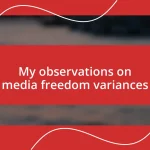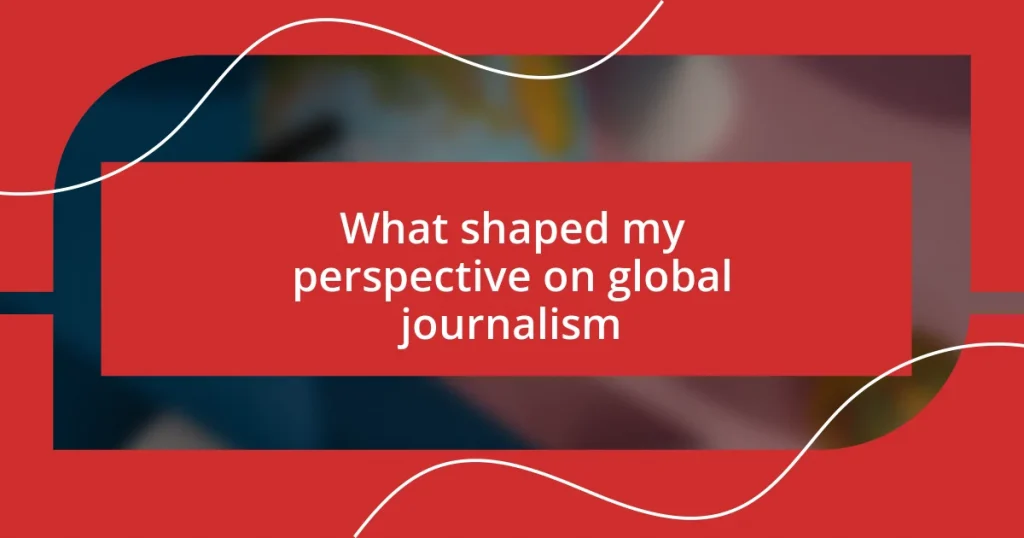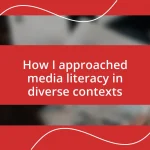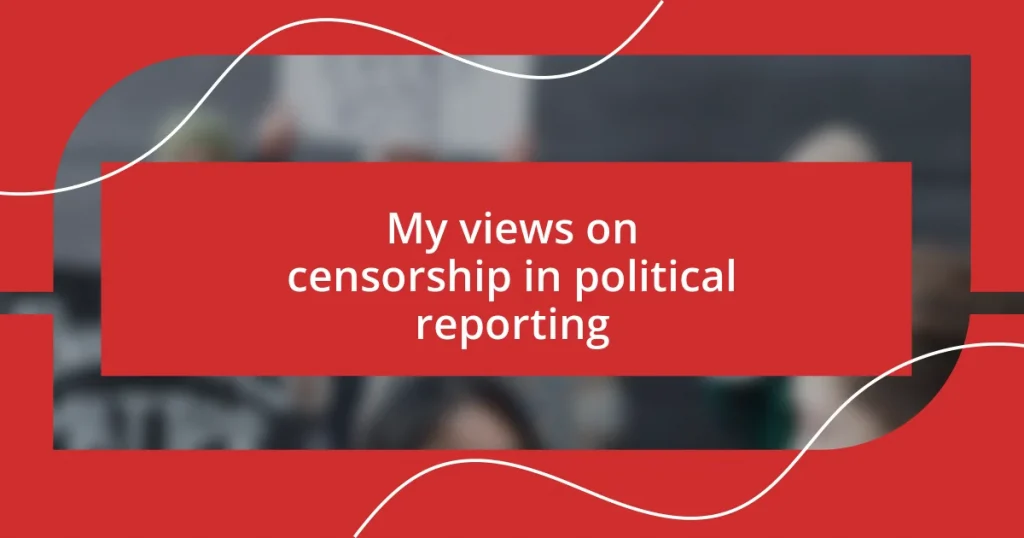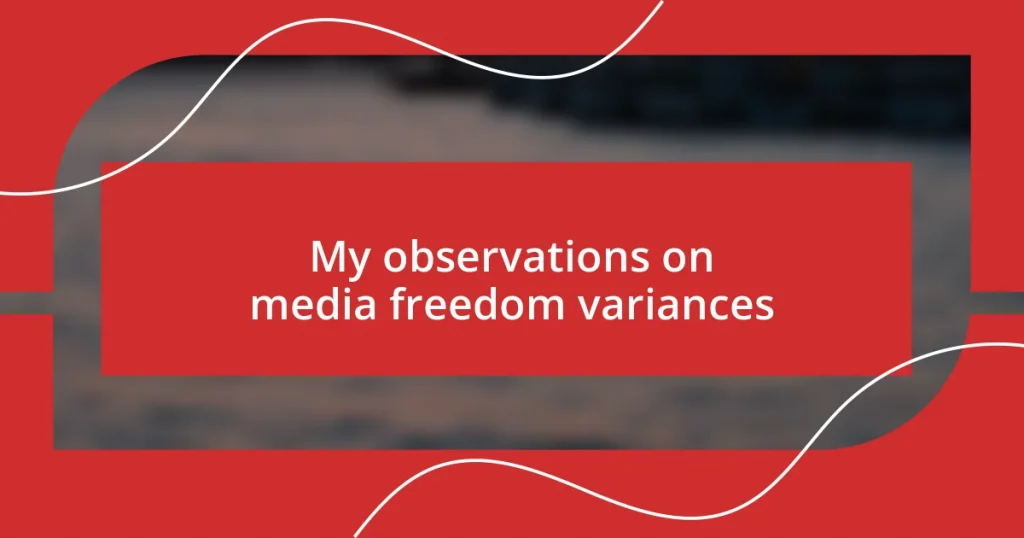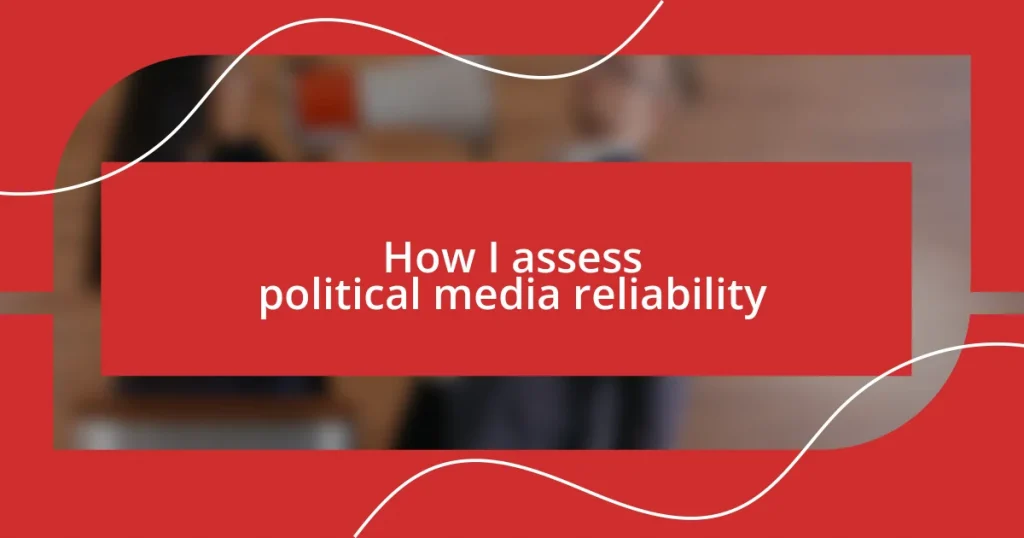Key takeaways:
- Witnessing a documentary on war correspondents ignited a passion for storytelling and highlighted the responsibility of journalists to convey truth and empathy.
- Volunteering with a local news outlet revealed the power of journalism in amplifying marginalized voices and advocating for community issues.
- Experiencing backlash for a culturally sensitive piece emphasized the importance of cultural understanding and ethical responsibility in reporting.
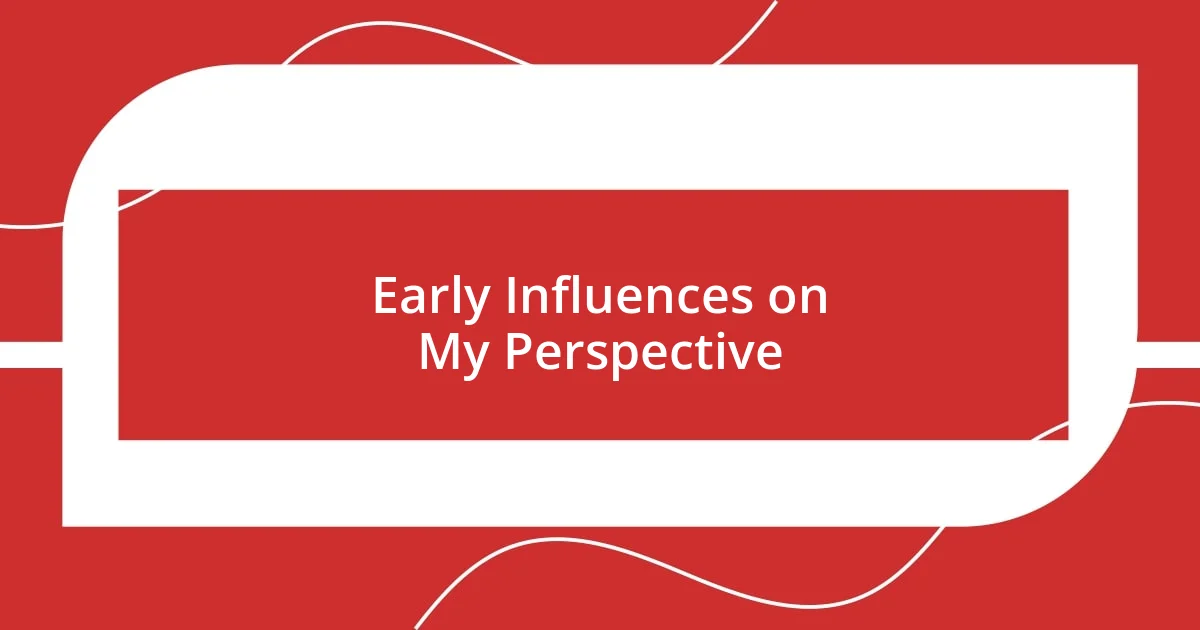
Early Influences on My Perspective
One of the earliest influences on my perspective came during high school when I stumbled upon a documentary about war correspondents. I vividly remember feeling a mix of admiration and fear as I watched these brave journalists risk everything to uncover the truth. How could anyone be so courageous? It was a moment that sparked a fire in me, making me realize the weight of responsibility that comes with storytelling.
My first internship at a local newspaper was transformative as well. I found myself thrown into the fast-paced world of journalistic deadlines and ethics. There was one assignment where I had to cover a community meeting about a controversial local issue. The emotions in that room were palpable, and I felt a deep connection to the people’s voices. It made me ponder: how often do we overlook the stories that matter most in our communities?
Additionally, my travels in college opened my eyes to the diversity of perspectives around the globe. I met students from various backgrounds, each sharing their views on pressing global issues. Their stories challenged my assumptions and broadened my understanding. It left me wondering, how can one medium convey such a wide array of experiences? This realization placed an immense value on empathy in journalism, shaping my approach to storytelling as I learned to listen more deeply.
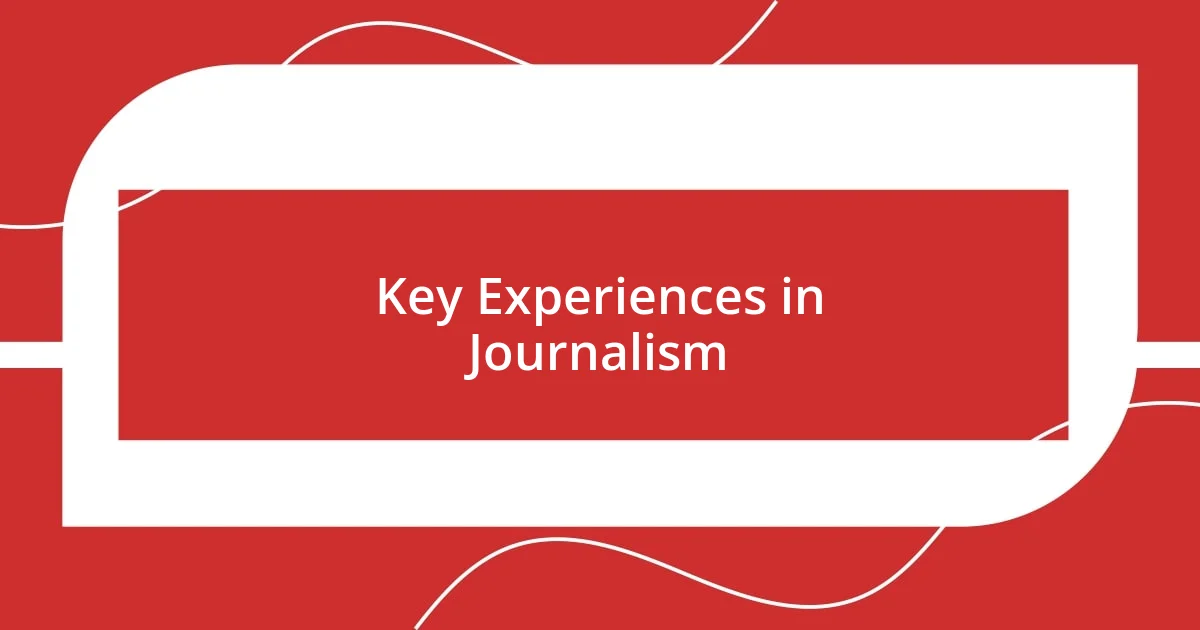
Key Experiences in Journalism
One of the most significant experiences that shaped my journey in journalism happened during my study abroad semester. I volunteered with a local news outlet that reported on social justice issues affecting marginalized communities. It was enlightening to witness how a single article could amplify unheard voices and ignite community action. I remember interviewing a woman who shared her struggles for basic rights. Her story resonated with me, demonstrating the profound impact journalists can have by giving people a platform. This moment reinforced my belief that journalism is not just about reporting facts; it’s about advocating for those who feel invisible.
Another pivotal experience was when I covered a major political event during an election cycle. The atmosphere was electric, filled with hope and anxiety. I was surprised by how emotionally charged the crowd was; the stakes were high, and everyone seemed deeply invested in the outcome. At one point, I overheard a young man speaking passionately about the future of his country, and I realized that my role was to capture those emotions authentically. This taught me the importance of not only reporting on events but also recognizing the human stories behind the headlines. Understanding people’s motivations and emotions transformed the way I approach journalism.
Lastly, attending a workshop on investigative journalism was enlightening. The energy in the room was contagious, filled with seasoned journalists sharing their hard-earned wisdom. One exercise involved analyzing a real case to identify biases in reporting. I was surprised at how easily certain narratives could be skewed. This experience hammered home the idea that our personal perspectives often shape our journalism. It prompted me to take a step back and examine my own biases, reinforcing my commitment to strive for fairness and accuracy in all my reporting.
| Experience | Insight Gained |
|---|---|
| Volunteering with local news | Impact of storytelling on marginalized voices |
| Covering political event | The emotional stakes behind reporting |
| Investigative journalism workshop | Identifying and addressing personal biases |
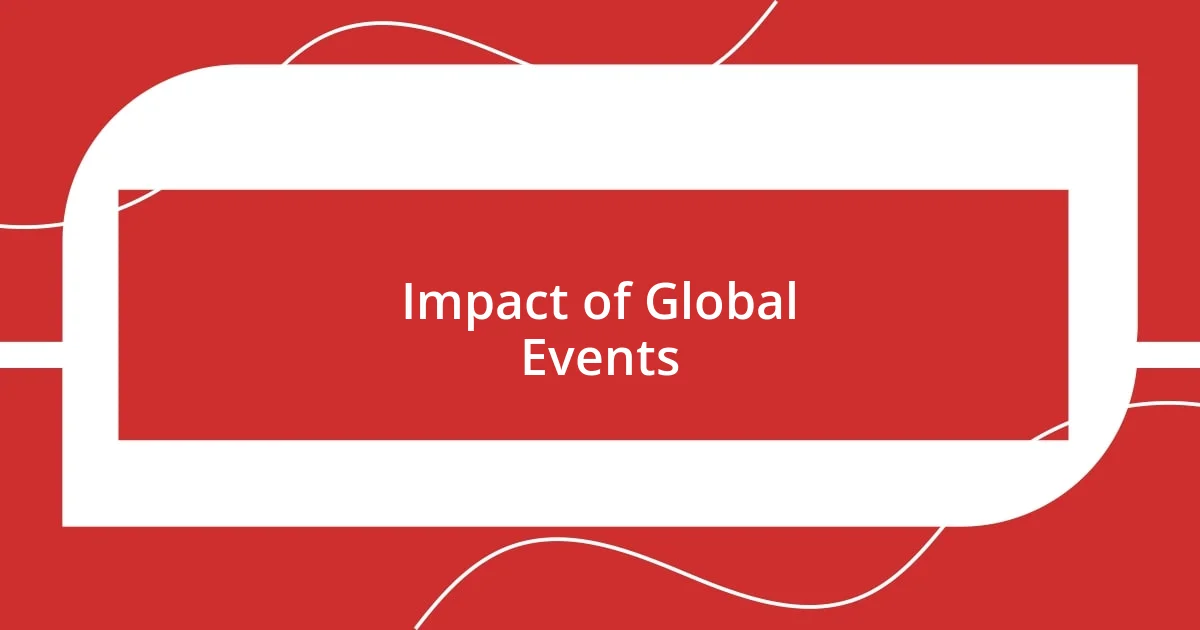
Impact of Global Events
The impact of global events on my perspective has been profound. I still recall the day when news broke about a natural disaster halfway across the world. As the coverage unfolded, I sat glued to my screen, feeling both empathy and helplessness. The urgency in the journalists’ voices, combined with the raw footage, compelled me to reflect on the responsibility that comes with reporting such stories. It made me realize how essential it is for journalists to not just report facts but also to convey the human emotions behind the headlines—those moments of despair, hope, and resilience that define us as a global community.
- Witnessing a journalist cover a refugee crisis sparked my understanding of compassion in reporting.
- A global pandemic reminded me of journalism’s role in disseminating crucial information swiftly to protect lives.
- Watching the world unite during a climate rally revealed the power of collective storytelling for advocacy.
In another instance, I traveled to a country experiencing political upheaval. Interacting with local journalists who were bravely reporting under duress was eye-opening. They shared their fears but also their unwavering commitment to their craft, which profoundly affected me. Their passion illuminated how global events can inspire journalists to prioritize truth even in the face of danger. That experience not only deepened my respect for my colleagues worldwide but also reinforced my belief in the importance of integrity in storytelling.
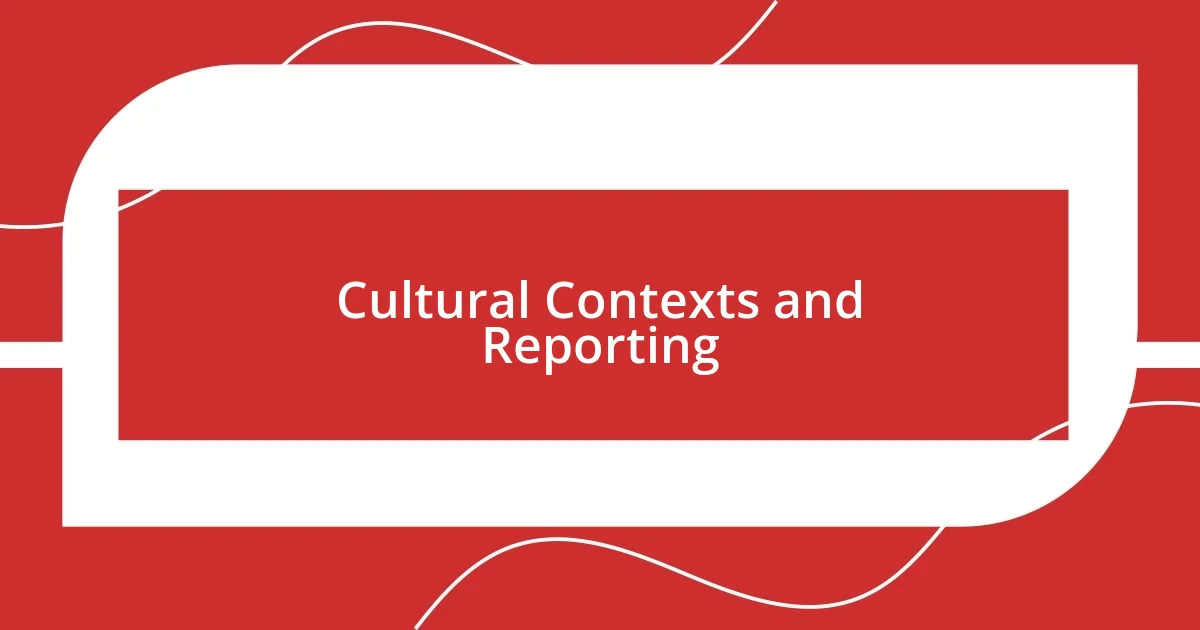
Cultural Contexts and Reporting
Cultural contexts play a crucial role in shaping how stories are perceived and reported. I remember sitting in a bustling café during my first international assignment, surrounded by the chatter of locals discussing their daily lives. It struck me how deeply their cultural expressions influenced the way they viewed the world. Suddenly, I realized that reporting isn’t just about capturing events; it’s about understanding the cultural lenses through which those events are interpreted. This revelation made me question: How can I ensure that I’m not just a passive observer, but an active participant in conveying those unique perspectives?
During another assignment, I covered a community festival that celebrated heritage and identity. As I interviewed attendees, I was moved by how their stories intertwined with historical narratives. It became evident that journalism is not merely about reporting actionable news, but rather about honoring traditions that shape people’s identities. I felt a responsibility to convey not only the facts but the emotions that animated the festival. The vibrant colors and sounds of that day served as a reminder that every report has the power to highlight the beauty and complexity of cultural life.
I also reflect on a moment when I faced backlash for a piece I wrote on a sensitive cultural topic. It taught me an invaluable lesson about the weight of cultural sensitivity in reporting. The reactions were a mix of anguish and understanding, which made me consider: How can one balance the truth with respect for cultural nuances? This experience reinforced my commitment to approach each story not just as an outsider, but as someone who must navigate the intricate web of beliefs and values inherent to a community. Ultimately, I learned that effective reporting requires empathy and a deep understanding of the diverse narratives that exist within any cultural context.
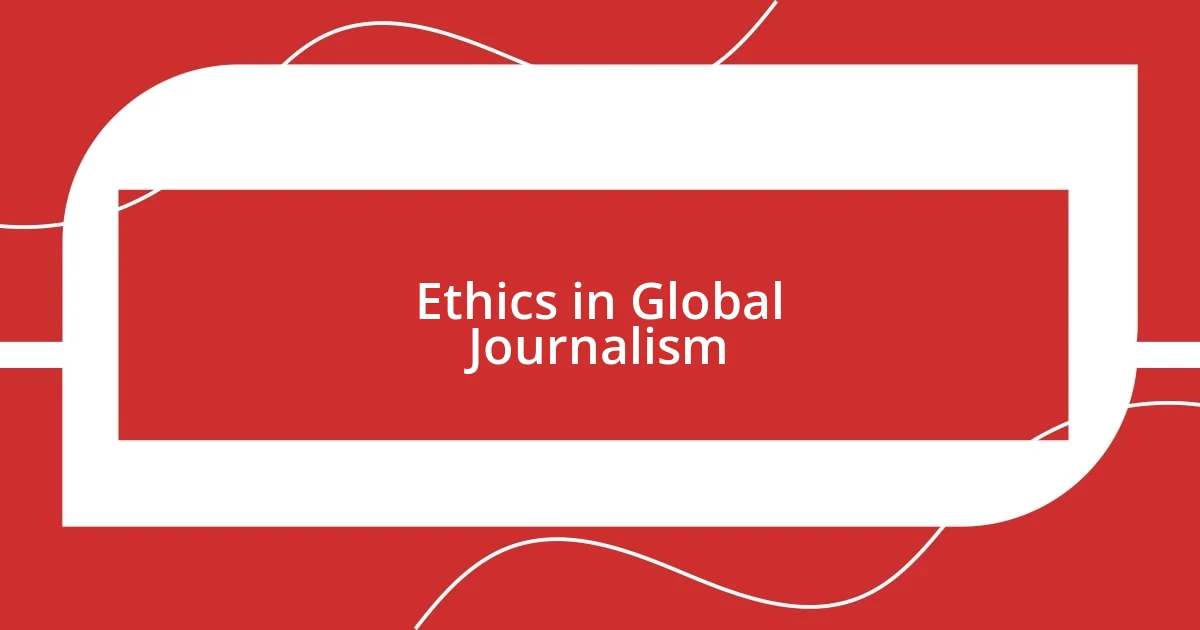
Ethics in Global Journalism
Ethics in global journalism are paramount, often shaping not just the narratives we share but also the trust we build with our audience. During a particularly challenging assignment in a conflict zone, I encountered a local journalist who had to decide whether to publish harrowing images from the frontline or to protect the dignity of those involved. This moment struck me; it illustrated the delicate balance between delivering a powerful story and respecting the very people at its heart. I found myself asking, how do we ensure that our pursuit of truth does not compromise our humanity?
In another instance, while reporting on the plight of displaced communities, I grappled with my own biases and assumptions. One afternoon, I sat down with a family who had lost everything, sharing a meal and their hopes for the future. I realized then that telling their story required a commitment to authenticity and ethical responsibility—how could I genuinely represent their voices without imposing my narrative? This experience deepened my understanding of informed consent, highlighting that informed ethical choices can transform journalistic practice into something profoundly impactful.
I often think about how the rush for breaking news can sometimes cloud ethical judgment. When covering humanitarian crises, it’s easy to get swept up in sensationalism, but I believe integrity should be our guiding beacon. I remember a colleague who chose to walk away from a lucrative opportunity to sensationalize a tragic event. Seeing their commitment to uphold ethical standards even at personal cost inspired me to do the same. It’s vital to remember that each report influences hearts and minds; we must approach our work with careful consideration of its potential implications.
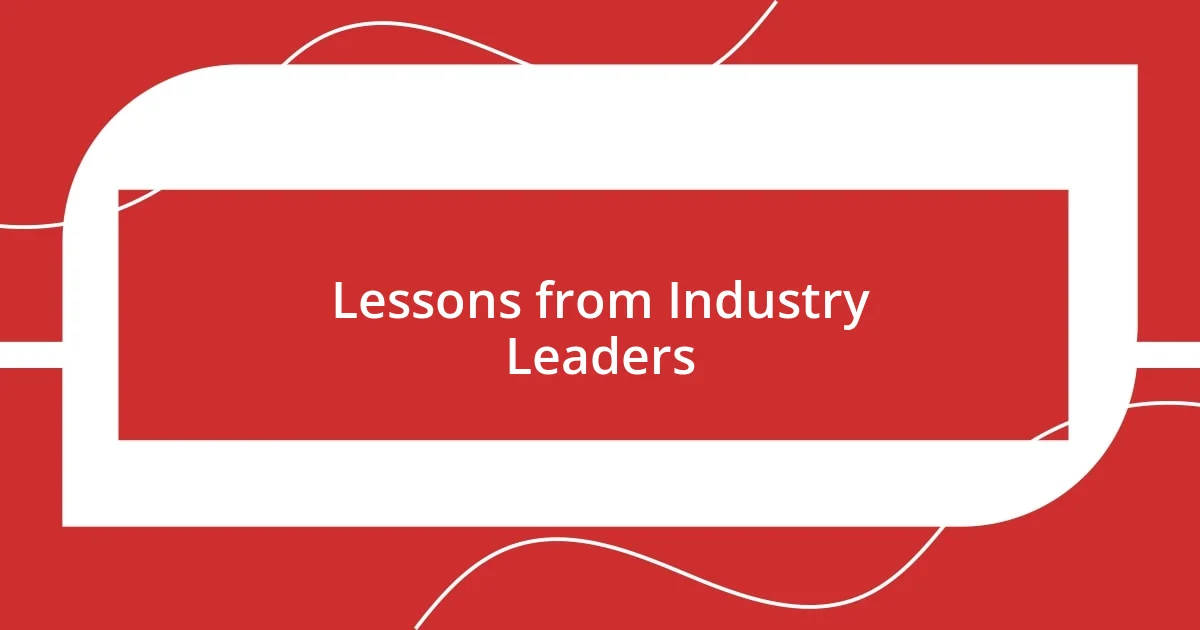
Lessons from Industry Leaders
The wisdom shared by industry leaders has been a guiding light in my journey as a journalist. I remember attending a panel discussion where a seasoned foreign correspondent shared her rule: “Always prioritize the voices of the marginalized.” This struck a chord with me. I thought about how often the loudest voices drown out the quieter, yet equally vital, narratives. It reminded me that my role is not just to report, but to advocate for those whose stories might otherwise go untold.
Another valuable lesson came from a mentor who emphasized the importance of adaptability in journalism. During a fast-evolving political crisis, I witnessed how quickly misinformation spread, and it became clear that being flexible is crucial. As I observed leaders in the field adjust their strategies in real-time, I wondered: How can we anticipate changes while maintaining accuracy? This experience taught me that resilience is just as important as precision in our reporting.
Listening to industry pioneers also taught me the power of storytelling. In one workshop, a veteran journalist spoke about the “human element” in every story. She recounted a simple yet profound moment when she sat with survivors after a disaster. Their stories unveiled not just the events but the raw emotions behind them—fear, hope, and resilience. I realized that embracing this human connection is essential; it adds depth to our reports and allows us to forge a stronger bond with our audience. How can we truly connect if we don’t understand the heart behind the headlines?
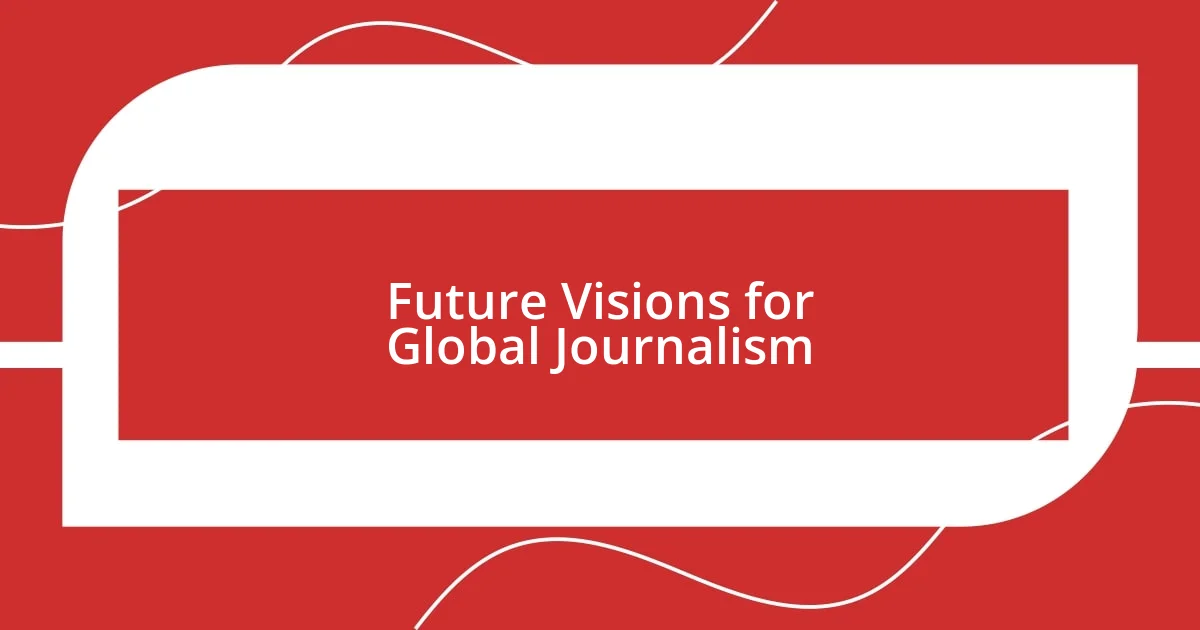
Future Visions for Global Journalism
Imagining the future of global journalism, I see a landscape characterized by increased collaboration and sharing of resources. Just last year, I participated in an international project where journalists from diverse backgrounds came together to report on climate change’s impact across borders. It was eye-opening. Engaging with different perspectives not only enriched our narratives but also fostered a sense of unity in our mission to inform and empower audiences globally. How could collaboration reshape the stories we tell?
As technology continues to evolve, I’m excited about the potential for immersive storytelling techniques like virtual reality and augmented reality to enhance our narratives. I remember experimenting with a VR feature during a digital storytelling workshop. The ability to transport viewers to a scene transformed their understanding of the subject matter. It made me realize that the medium through which we communicate can significantly impact how a story resonates. What if more journalists embraced these innovative tools to break down barriers and create deeper connections with our audience?
In envisioning ethical standards for future journalism, I find myself pondering the balance of speed and accuracy in a world driven by instant gratification. I once rushed to publish a story on a recent event without thorough fact-checking, and the fallout was a harsh reminder of the responsibility we bear. I believe that maintaining our commitment to accuracy amidst the demands for immediacy will be crucial moving forward. How can we foster a culture that values truth over speed, ensuring that the stories we tell today become the trusted records of tomorrow?

